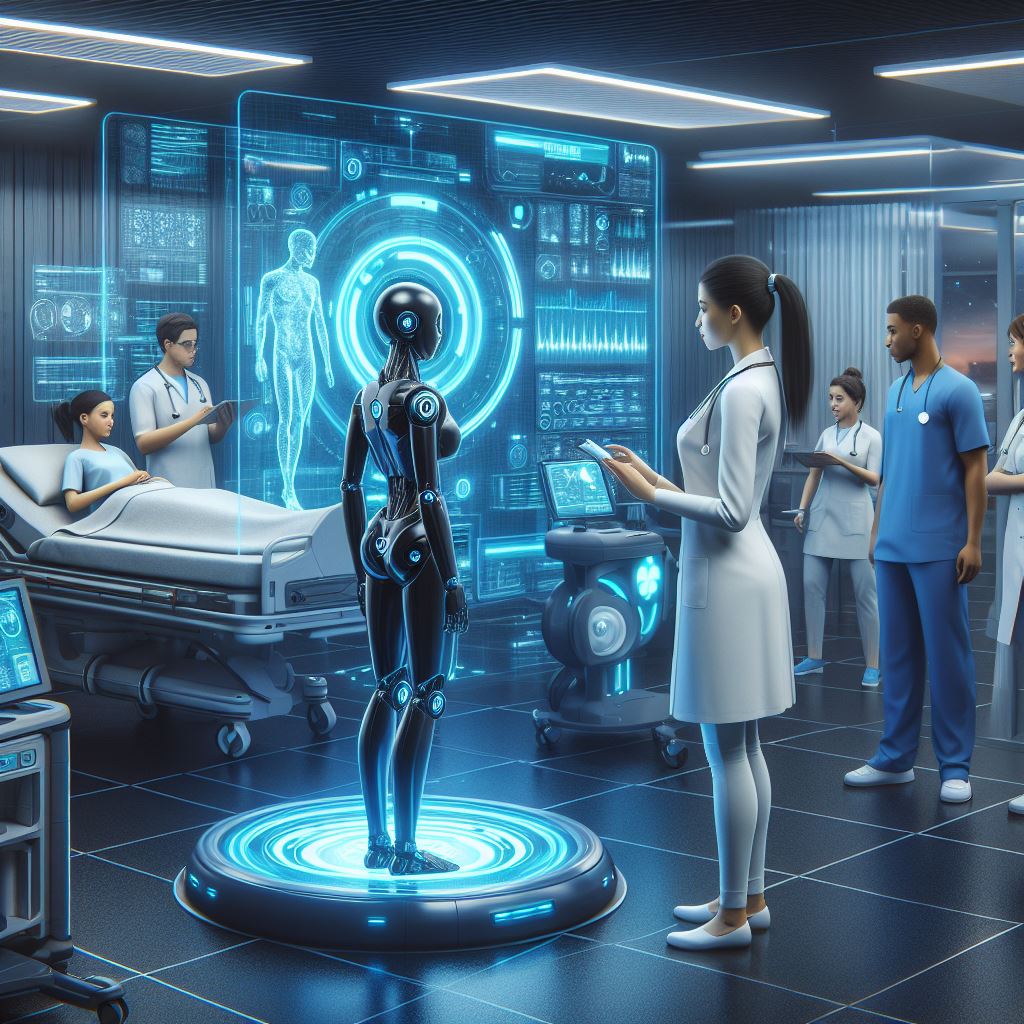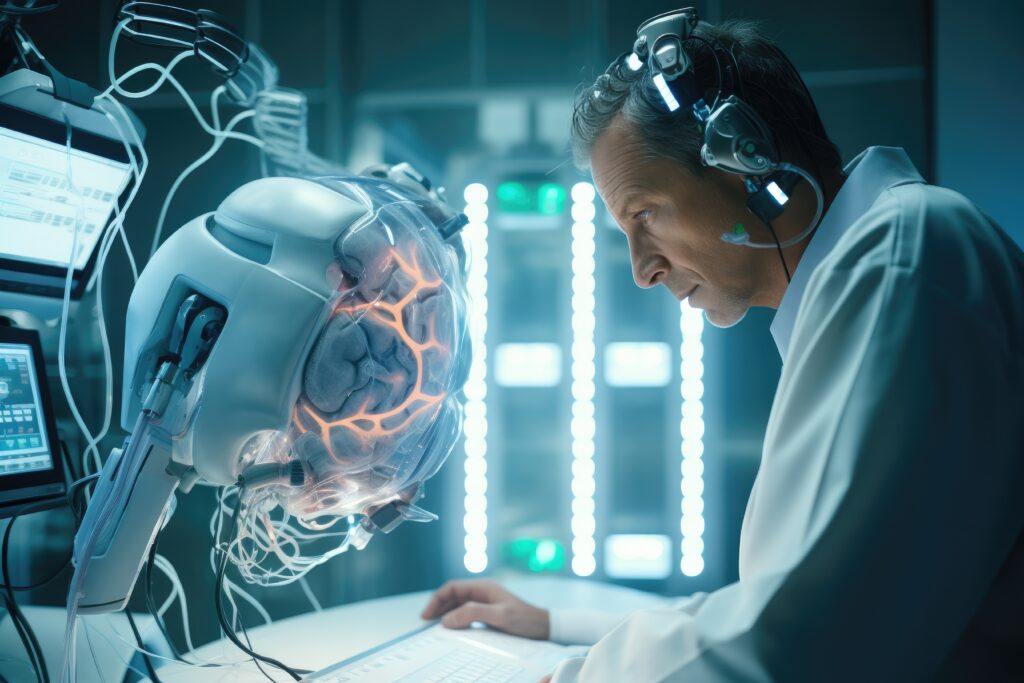
Table of Contents
I. Introduction
A. Brief overview of the impact of Artificial Intelligence in Healthcare
In healthcare’s dynamic landscape, technology, particularly “Artificial Intelligence in Healthcare,” stands out as a transformative force. This section offers a concise overview of how technology, especially AI, is reshaping healthcare processes and patient care. Key topics include the strategic integration of the focus keyword for SEO, the impact of Artificial Intelligence on diagnostics and treatment, optimizing patient-centric care, addressing challenges, and a forward-looking perspective on technology as a catalyst for ongoing innovations in healthcare. This brief but comprehensive overview sets the stage for a deeper exploration of AI’s transformative potential in healthcare.

B. Introduction to Artificial Intelligence (AI) and its transformative potential
In healthcare’s dynamic evolution, Artificial Intelligence (AI) stands out as a revolutionary force. This section provides a concise exploration of how AI is reshaping patient care, navigating from diagnostics to personalized medicine. Key themes include Artificial Intelligence’s role in revolutionizing diagnostics, tailoring treatments through algorithms, and enhancing patient communication. Concluding with a forward-looking perspective, this brief introduction sets the stage for a deeper exploration of AI’s transformative potential in healthcare.
C. Importance of integrating Artificial Intelligence in Healthcare for improved efficiency and patient outcomes
Delving into the importance of AI integration, this section explores how Artificial Intelligence technologies can enhance efficiency, accuracy, and ultimately lead to better patient outcomes.
D. Thesis statement emphasizing the role of AI in shaping the future of healthcare
The thesis statement asserts that AI is not just a technological advancement; it is a catalyst for transformative change in the healthcare sector, shaping the future of patient-centric innovation.
II. The Current Landscape of Healthcare
A. Overview of existing challenges in the healthcare industry
This section provides a comprehensive overview of the challenges faced by the healthcare industry, from inefficiencies in processes to delays in patient care.
B. The need for innovation and technological solutions
Highlighting the pressing need for innovation, this part emphasizes how technology can address existing challenges and pave the way for a more efficient healthcare system.
C. Introduction to the concept of AI as a game-changer in healthcare
As an introduction to the transformative potential of AI, this section lays the groundwork for understanding how AI can be a game-changer in overcoming healthcare challenges.

III. Applications of Artificial Intelligence in Healthcare
A. Diagnostic and Imaging Technologies
- AI-assisted medical imaging for accurate and timely diagnoses
Exploring the realm of AI-assisted medical imaging, this subsection showcases how AI algorithms revolutionize diagnostic accuracy, providing timely and precise diagnoses.
- Streamlining radiology processes through AI algorithms
A deep dive into how Artificial Intelligence algorithms streamline radiology processes, reducing workload and improving overall efficiency in diagnostic procedures.
B. Predictive Analytics for Disease Prevention
- AI-driven models for early detection of diseases
This subsection explains the significance of AI-driven models in predicting and detecting diseases at an early stage, enabling proactive healthcare measures.
- Utilizing machine learning to identify potential health risks
Examining the role of machine learning in identifying potential health risks, this part highlights the preventive potential of Artificial Intelligence in Healthcare.
C. Personalized Treatment Plans
- Tailoring treatment strategies based on individual patient data
This section explores how AI algorithms analyze individual patient data to tailor treatment strategies, ushering in an era of personalized medicine.
- Enhancing precision medicine with AI algorithms
Highlighting the ways AI contributes to precision medicine, this part illustrates how personalized treatment plans can lead to improved patient outcomes.
D. Virtual Health Assistants and Chatbots
- Improving patient engagement and communication
An exploration of how virtual health assistants and chatbots enhance patient engagement and communication, providing a more interactive and accessible healthcare experience.
- 24/7 availability for medical information and assistance
This section highlights the around-the-clock availability of AI-driven virtual assistants, ensuring patients have access to medical information and assistance whenever needed.
IV. Benefits and Challenges

A. Positive Impact of Artificial Intelligence in Healthcare
- Improved diagnostic accuracy
Detailing how Artificial Intelligence enhances diagnostic accuracy, leading to more precise and timely identification of medical conditions.
- Enhanced treatment outcomes
Exploring how AI contributes to improved treatment outcomes, ensuring patients receive tailored and effective interventions.
- Increased efficiency in healthcare delivery
This section elaborates on how AI streamlines processes, reduces administrative burdens, and ultimately increases the overall efficiency of healthcare delivery.
B. Addressing Concerns and Challenges
- Data privacy and security
Examining the concerns related to data privacy and security, and how healthcare systems can address these challenges to ensure patient confidentiality.
- Ethical considerations in AI-driven healthcare
Delving into the ethical considerations surrounding Artificial Intelligence in Healthcare, including issues related to bias, accountability, and patient consent.
- Integrating AI with existing healthcare systems
This section discusses the challenges and strategies involved in integrating AI seamlessly with existing healthcare systems.

V. Future Trends and Innovations
A. Advancements in AI technology for healthcare
Exploring the latest advancements in AI technology, this section provides insights into how future innovations will shape the landscape of healthcare.
B. Emerging trends shaping the future of Artificial Intelligence in Healthcare
Identifying the emerging trends that will play a pivotal role in shaping the future of Artificial Intelligence in Healthcare, from advanced diagnostics to personalized medicine.
C. Potential breakthroughs and their impact on patient care
Discussing potential breakthroughs in AI and their transformative impact on patient care, including the development of cutting-edge therapies and treatment modalities.
VI. Case Studies
A. Highlighting successful implementations of Artificial Intelligence in Healthcare
This section presents real-world examples of successful AI implementations, showcasing how organizations have leveraged AI to improve patient outcomes and operational efficiency.
B. Showcasing real-world examples of improved patient outcomes and operational efficiency
Case studies illustrate the tangible benefits of Artificial Intelligence in Healthcare including improved patient satisfaction, reduced costs, and enhanced overall efficiency.
VIII. Conclusion
A. Summarizing the transformative role of Artificial Intelligence in Healthcare
Summarizing key points, this section reiterates the transformative role of Artificial Intelligence in Healthcare, emphasizing its potential to revolutionize patient-centric innovation.
B. Emphasizing the potential for continued innovation and positive impact on patient care
Concluding with an optimistic outlook, this part highlights the ongoing potential for innovation in AI and its positive impact on future patient care.


